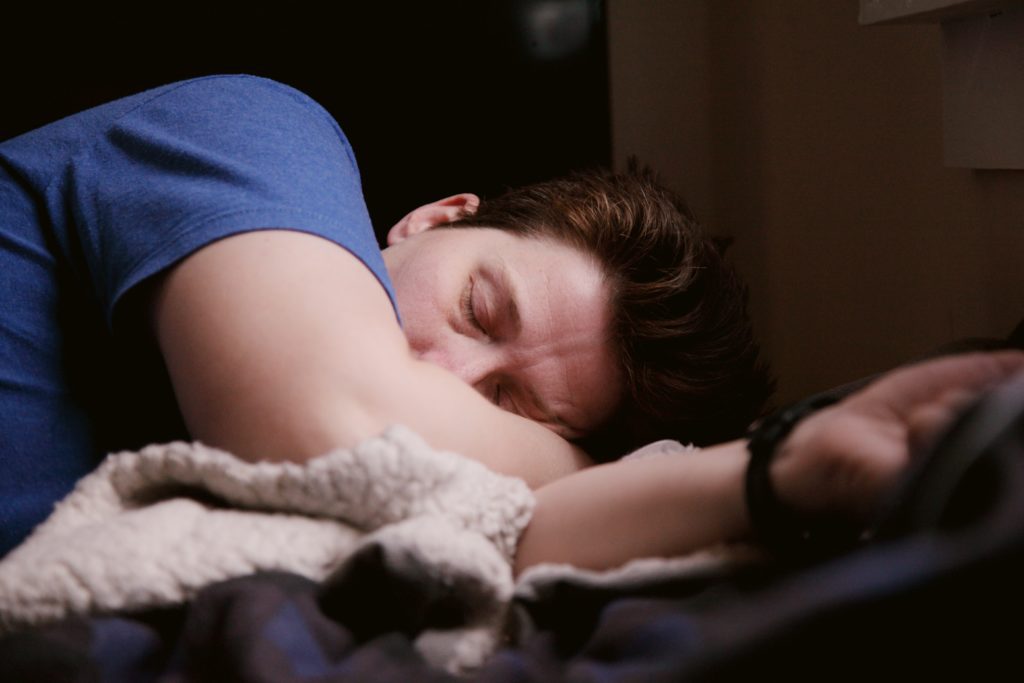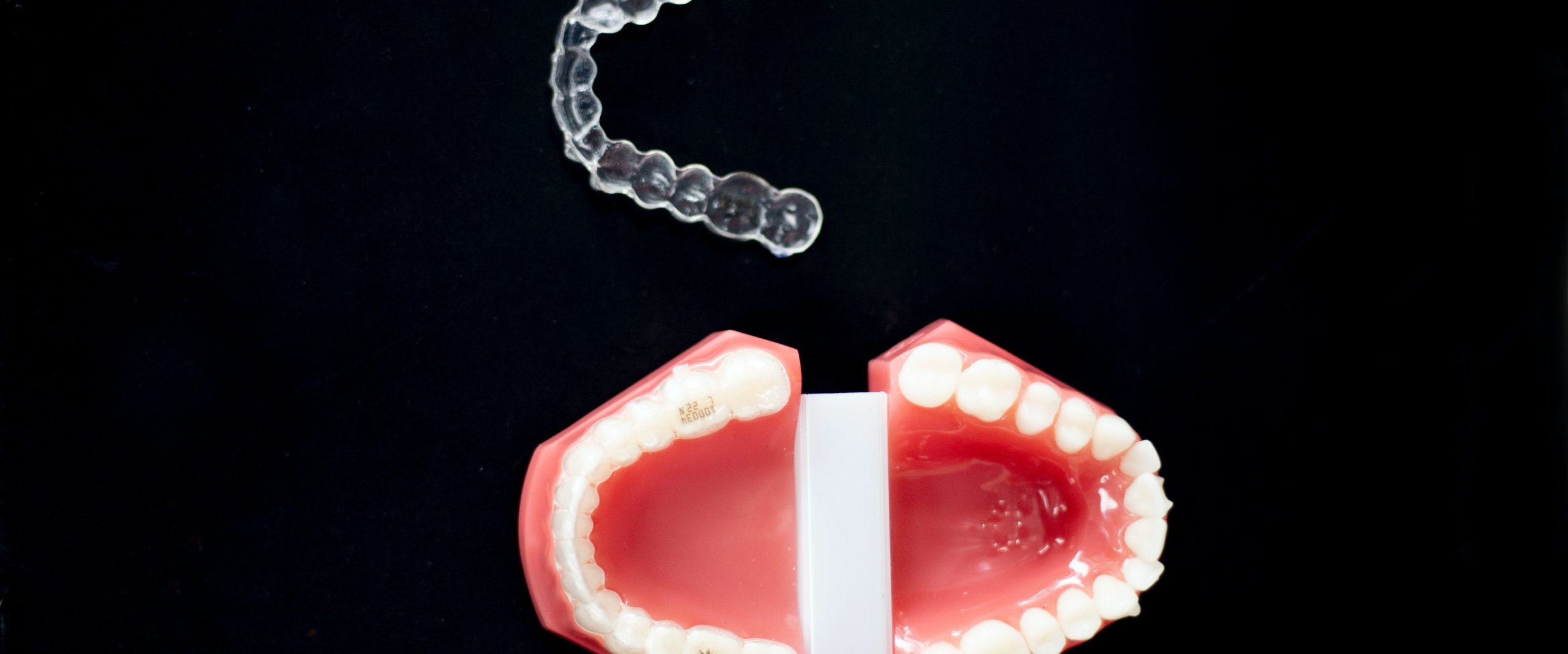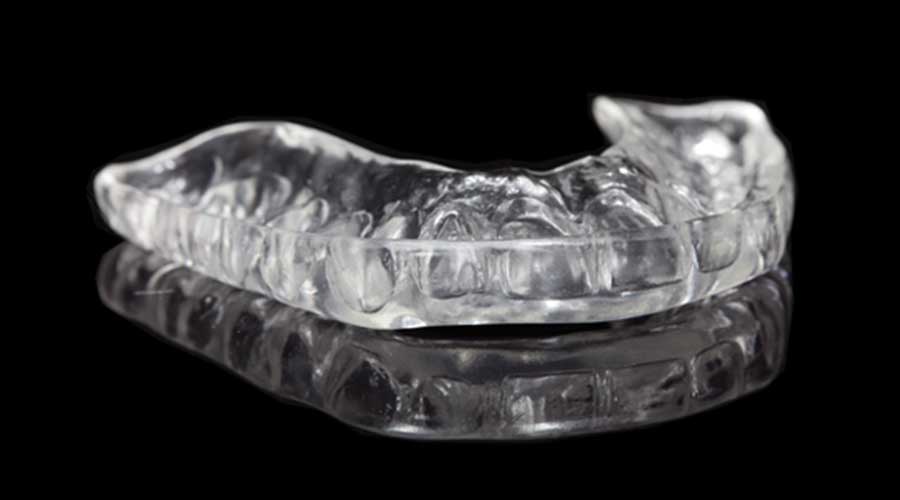A good night’s sleep is essential to our overall health. Teeth grinding, snoring, and other related conditions can prevent you – or your loved ones – from getting the rest needed to fully revitalize the body.
The dental team at New Look Dental provides custom fit mouthguards that can be used to treat cases of:
- Bruxism (teeth grinding)
- TMD/TMJ
- Sleep apnea
- Snoring
Mouthguards protect your oral health from clenching and grinding
A sleep mouthguard, also called a night guard, is the most effective way to prevent long-term damage from teeth grinding. Mouthguards keep your top and bottom teeth separate while you sleep and act as a protective barrier.

Waking up with a sore jaw may indicate teeth grinding
If you normally wake up with jaw pain, tooth pain, or sore gums, there is a good chance you are grinding your teeth in your sleep. This condition is called Bruxism, which refers to both grinding and jaw clenching. Additional signs that you may be suffering from Bruxism include facial pain and earaches.
Without intervention, Bruxism can lead to severe tooth damage that may eventually require costly dental treatments to fix if left untreated. As your teeth grind against each other, the enamel wears away. This compromises the natural protection of your teeth and may eventually cause nerve damage that makes simple tasks like eating and speaking painful.
Jaw clenching can result in the development of a condition called TMJ
As Bruxism progresses, patients may develop a condition called TMD/TMJ. This disorder of the jaw joint is characterized by jaw muscle soreness, locking, and clicking. Patients may also experience neck pain, ear pain, and headaches.
Night guards can help prevent bruxism from causing TMD/TMJ, and can also relieve pain for patients who already suffer from the condition. The mouthguard adjusts the jaw into a healthier position, helping to relieve stress on the joints. Though mouthguards cannot cure TMJ, they can be incredibly effective at preventing further injury and relieving side-effects.
What type of mouthguard do you need?
There are three main types of nighttime mouthguards to prevent teeth grinding and jaw clenching. Your dentist can help you determine which mouthguard is best for your individual case:
- Soft night guards. These mouthguards are made from a flexible material and are the most comfortable to sleep in. They can last anywhere from 6 months to 2 years. Soft night guards are used for mild cases, as more severe grinders will damage the material over time.
- Hybrid or dual laminate night guards. Hybrid night guards are best for moderate cases of Bruxism. They are soft inside but have a harder exterior to provide added protection. While they can be slightly more difficult to adjust to than their soft counterparts, they are more durable. Hybrid mouthguards last anywhere from 1-3 years.
- Hard night guards. This type of mouthguard is used for the most severe cases of Bruxism. Hard night guards are made from a strong acrylic made to withstand heavy grinding and clenching. They are typically more difficult to sleep in and must be fitted by a dentist.
Specialized sleep mouthguards can treat sleep apnea and snoring
Obstructive sleep apnea (OSA) is a serious condition in which the patient stops breathing briefly while asleep, jolting the body out of deep sleep. In the past, most sleep apnea cases were treated using a CPAP machine. These machines can be loud and uncomfortable. Because of this, many patients with mild cases of sleep apnea are turning to mouthguards for a less-invasive treatment option.
Although New Look Dental does not offer sleep mouthguards for treating sleep apnea and snoring, we are able to help direct our patients to services when they indicate symptoms or health-related issues.
Snoring and daytime sleepiness are signs of sleep apnea
Sleep apnea can be difficult to diagnose, but there are some signs to look out for. Snoring is one of the most common indicators of mild obstructive sleep apnea. If your bed partner has complained about your snoring, it may be a good idea to talk to your dentist about a sleep apnea mouthguard!
Chronic feelings of sleepiness throughout the day can also indicate that your body is not getting enough deep sleep. Some of the most common side effects of sleep apnea are grogginess, irritability, and inability to focus due to lack of deep sleep.
Mouthguards can treat mild to moderate sleep apnea cases
Sleep apnea mouthguards differ from mouthguards used to treat teeth clenching and grinding. While Bruxism mouthguards cover the teeth to prevent grinding, sleep apnea mouthguards pull the lower jaw forward. This helps to open your airway while you sleep.
Specialized sleep mouthguards for snoring work in a similar way, pulling the jaw forward to help you sleep better.
Both obstructive sleep apnea and snoring can prevent you and your loved ones from getting a good night’s sleep.

Talk to your dentist about mouthguards for sleep
Your dentist can create a custom fitted mouthguard for you to treat breathing issues while sleeping, as well as teeth grinding or clenching. It is imperative to your oral and overall health that these issues are treated in a timely manner in order to prevent further health problems.
Over the counter mouthguards are not custom fit
Mouthguards for grinding and snoring can be purchased online or over the counter, but there is little research into whether these mouthguards are actually effective at treating Bruxism, sleep apnea, or snoring. They can also make breathing difficult, and can be uncomfortable to sleep in.
Instead, visit your dentist to have a custom mouthguard made for your specific needs. Your dentist can help you determine which mouthguard is right for you, and ensure that it is properly fitted for your mouth.
Custom mouth guards are made from an impression of your teeth. Because of this, they are much more comfortable for sleeping and will not move around or fall out during the night. Mouthguards that are made in a dental lab are also more durable and made with high-quality materials, unlike many over the counter options.
With proper care, your mouthguard will last years
Though it is more expensive to have a custom mouthguard made, they will maintain their integrity for years! Here are some tips to help you extend the life of your night time mouthguard:
- Practice regular dental hygiene before placing your mouthguard at night to prevent bacteria growth
- Regularly check for signs of damage
- Store your mouthguard in a protective, hard, container
- Clean your mouthguard after each use using a toothbrush and toothpaste. You can also use antibacterial mouthwash in addition to brushing.
- Tell your dentist if your mouthguard becomes uncomfortable at any time, or if you notice any tender spots in your mouth or on your gums.
